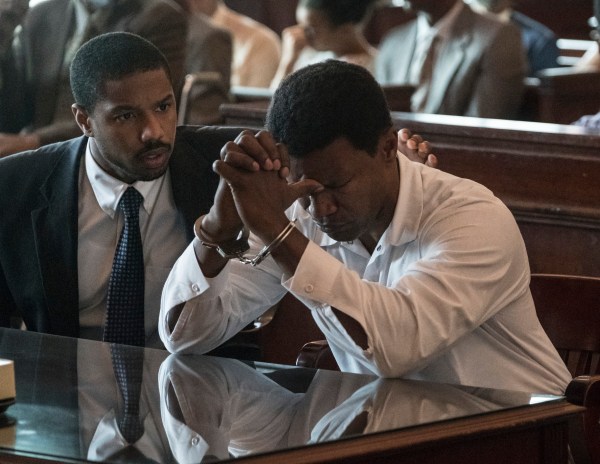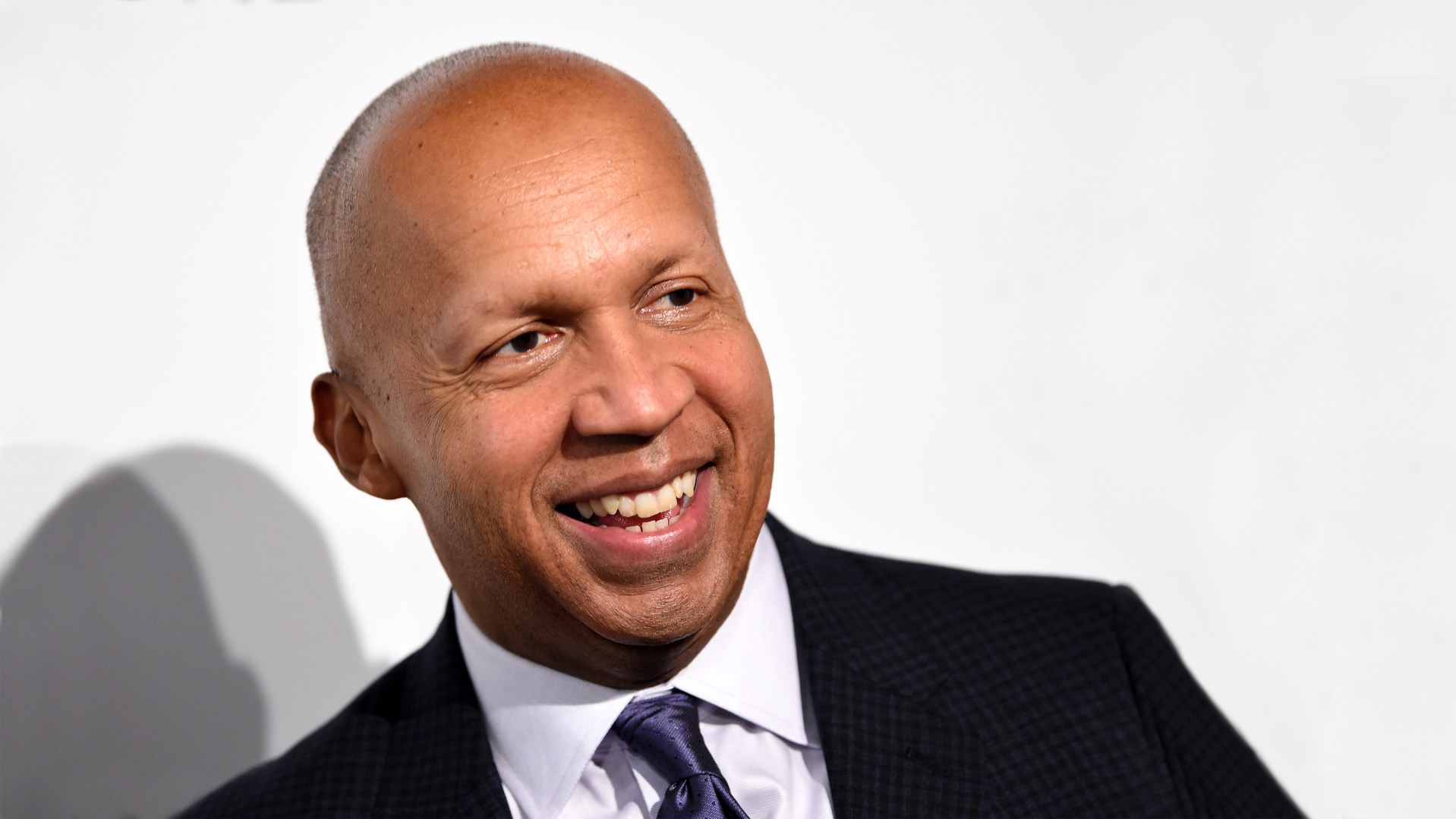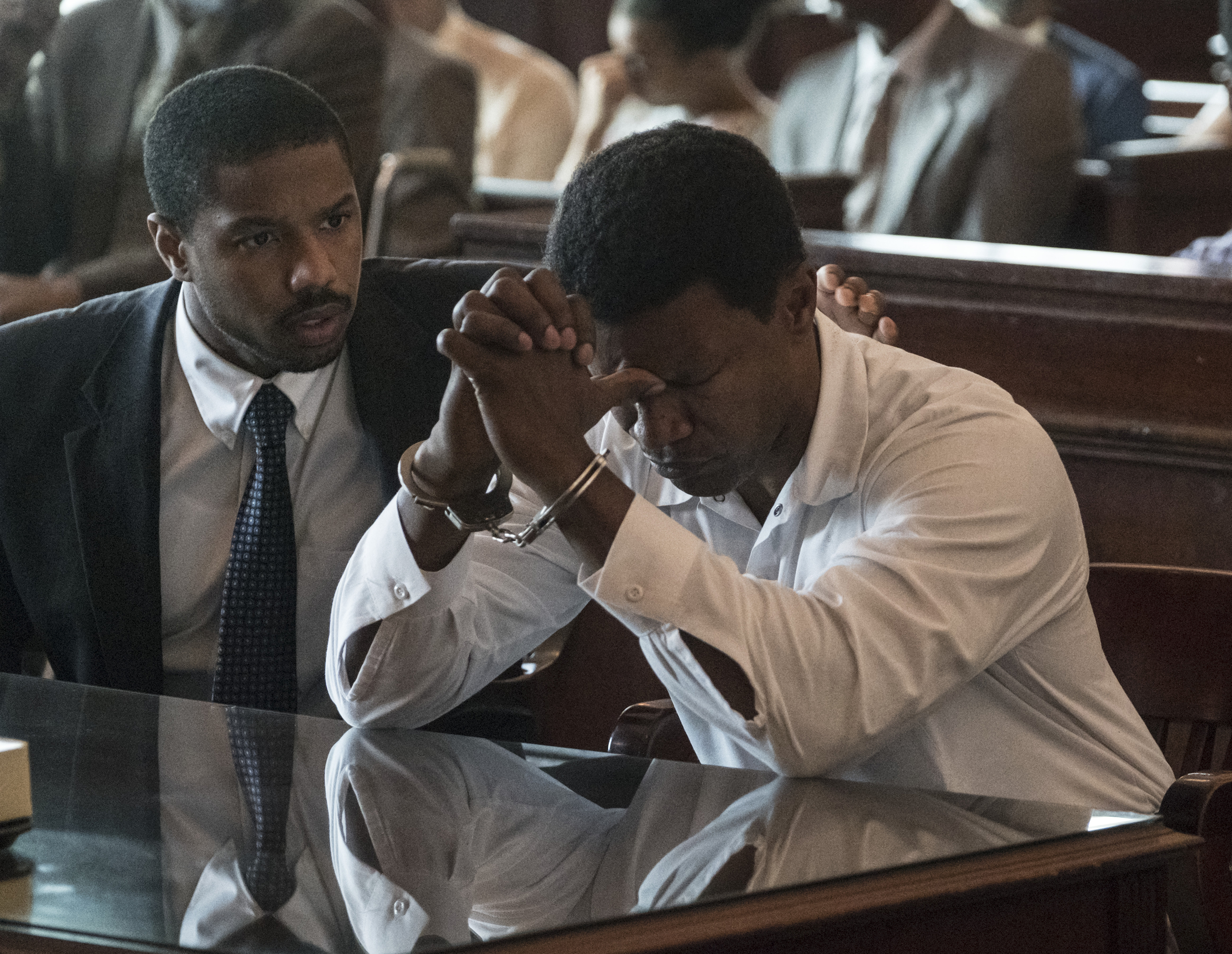Since 1973, 166 people in the US have been exonerated from death row. In 2018 alone, wrongly convicted people lost more than 1,600 years of their lives behind bars. Many exonerated individuals never received any form of reparations. One man, Anthony Ray Hinton, spent 30 years on death row for a crime he did not commit. Though he was exonerated with the help of the Equal Justice Initiative in 2015, Hinton has not received an apology from the state, or from anyone involved in his prosecution, for the years stolen from him.
The film Just Mercy, which releases January 10, provocatively beckons all—especially the US church—to confront the unjust nature of our nation’s criminal justice system. The film provides a sobering glimpse into how race, class, and systemic sin inform culpability and judicial verdicts. Revolving around the faith-rooted activism of Bryan Stevenson (played by Michael B. Jordan) and the creation of the Equal Justice Initiative (EJI), Just Mercy recounts the tragic story of Walter McMillian (Jamie Foxx). McMillian, or Johnny D., was an African American who owned a lumber company in a small Alabama town and was framed for the murder of Ronda Morrison—an 18-year-old white girl.
The film chronicles Stevenson’s graduation from Harvard Law School and move to Montgomery, Alabama, where he opens a law firm that provides legal defense for those awaiting execution on death row. McMillian’s case was one of the first, and most difficult, cases of Stevenson’s career. Just Mercy illuminates Stevenson’s relentless pursuit of truth and justice, commitments that led Archbishop Desmond Tutu to knight Stevenson as “America’s Nelson Mandela” and enabled EJI to successfully challenge more than 125 death row convictions since 1989.
The US not only has the highest rate of incarceration in the world, we also have more people locked up than any other country in the history of the world. We also have more jails and prisons than degree-granting colleges and universities. In some areas of the country, there are more people living behind bars than on college campuses. Native Americans, Africans, Hispanics, and Southeast Asians are all grossly overrepresented within our justice system. EJI found that for every nine people executed on death row, one is found innocent and released.
US Christians must lament how the politics of fear and anger have tamed our witness in the world. Stevenson points out in his documentary True Justice that everybody imagines that, if they were in Alabama in the 1960s, they would have been marching with Martin Luther King Jr. “And, the truth of it is,” he says, “I don’t think you can claim that if today you are watching these systems be created that are incarcerating millions of people throwing away the lives of millions of people, destroying communities, and you’re doing nothing.”
Amid these lamentations, Stevenson remains a man of hope, love, and conviction. The true measure of our character, he is convinced, is proved through how we treat the poor, disfavored, incarcerated, and condemned.
Christianity Today asked Dominique DuBois Gilliard, director of racial righteousness and reconciliation for the Evangelical Covenant Church and author of Rethinking Incarceration, to talk to Bryan Stevenson about his work and hopes for the film. This interview has been edited for length and clarity.
What is the significance of the timing of the film’s release?
This is a critical time in our nation’s history. We’ve been so divided by the politics of fear and anger that it’s easy to stop caring about things we should care about. It’s easy to tolerate things we shouldn’t tolerate. And the way you combat that is to get people closer to inequality, to injustice, to things that are unfair. And that’s what story-making can do. That’s what films can do.
I’ve always loved the power of cinema to draw you into someone else’s life, someone else’s experience, and open your eyes and your heart to things that you need to see and feel. And that’s what I’m hoping to happen with this movie.
We have the highest rate of incarceration in the world. We have an incredibly extreme and harsh carceral system that treats a lot of people unfairly. A lot of people are vulnerable or exploited and abused. And I’d love to see that change, but it won’t change until people understand the cost of that. I’m hoping that the film will create an opportunity for them to feel the pain of inequality and injustice, but also the triumph of what can happen when we fight and we work. I am really thrilled that it’s happening at this moment when I think we are desperately in need of increasing the justice quotient in our nation.
There were two quotes that were really jarring for me in the film. One is when the other lawyer says, “If you go digging into those wounds, you’re going to make a lot of people very angry.” And, “When people care about a thing that much, they’re willing to do anything to get what they want.” What does it take to have the courage to pursue truth in a climate of fear, especially when you understand the cost of your choice?
The good news is that it’s not a new struggle. People of faith and people of conviction have always had to stand up when other people say sit down and to speak when other people say to be quiet. And you get oriented to live like that, to think like that, to believe like that.
 © 2019 WARNER BROS. ENTERTAINMENT INC. / Jake Giles Netter
© 2019 WARNER BROS. ENTERTAINMENT INC. / Jake Giles NetterI’m a product of a community where people were marginalized, poor, excluded. We had to learn to believe things we hadn’t seen, and my faith reinforced that. People don’t like when they are forced to confront things that aren’t pleasant, that are unhappy. But we have to do that. And I actually think people of faith have a critical role at that. We understand that if we want to get to a better place, if we want redemption, if we want restoration, that there has to be confession, there has to be repentance. We cannot be afraid to acknowledge wrongdoing, mistakes we’ve made—we understand that personally. We seem to understand it in our places of worship, but we don’t seem to see much evidence of that in the political and the cultural social spaces. And I just think that has to change.
But I am standing on the shoulders of people who have done so much more with so much less. In Montgomery, there’s a whole history of people courageously fighting the things that need to be fought. The generation before me would put on their Sunday best and go into a space where they knew they would likely be battered and bloodied and bruised, but they went anyway. And with that history in my head and that knowledge, I could feel like I’ve got to do the things that have to be done. And it’s part of what struggle requires.
Part of what I saw manifested in the movie is you seeing value in people who sometimes don’t see it in themselves, and having the conviction to fight for them even when they seem to not have that same conviction because the system has so thoroughly beat them down.
What has defined my work over the last 35 years is this belief that each of us is more than the worst thing we’ve ever done. I genuinely believe that no one is just their worst act. If you tell a lie, you’re not just a liar; or if you take something, you’re not just a thief—even if you’ve killed someone, you’re not just a killer. And justice requires that we know the other things that you are.
It’s easy to expect the worst part of you and just stay in that place, because it takes work and faith and hope and belief and love to transcend some of the difficult and painful things we do to one another. I think that’s what we’re called to do. And in that respect, the work can be both ministry and advocacy at the same time. I want the same things for me that I want for my client; I want the opportunity to be forgiven if I say the wrong thing or do the wrong thing. I can’t expect that for myself if I’m not going to give it to other people. That has shaped my work. I don’t want to see anybody burdened with the lie that their life doesn’t matter, that they’re beyond hope and beyond redemption or beyond any purpose. I don’t believe that for anyone. Part of what my work is about is trying to illuminate that path so that we can both see it.
How has the death penalty driven your work, especially after it was resuscitated on the federal level last year?
I think that the threshold question when it comes to the death penalty isn’t “Do people deserve to die for the crimes they’ve committed?” I think the threshold question is, “Do we deserve to kill?” If you have a system that treats you better if you’re rich and guilty; if you have a system defined by error, that’s made a lot of mistakes, that’s very unreliable; if you have a system compromised by bias against the poor or people of color, then I don’t think you deserve to kill. The long history of racial violence in this country ought to be disqualifying of a state that perpetrated genocide against native people, that tolerated enslavement for two centuries, that allowed lawlessness and terrorism and mob violence and lynching to define the first half of the 20th century. But that kind of history, that we would even want to use legal violence and as a measure or expression of our commitment to justice, seems very turned around. So for me, it’s very easy to stand with the condemned and to argue for something better—something that goes beyond the illogic of killing people to show that killing is wrong.
As a Harvard Law School graduate who had many opportunities coming out of law school, can you talk a little bit about how your faith informed your vocation?
I never had met a lawyer until I got to Harvard Law School. I didn’t really understand what I wanted to do. And when I met people on death row who were literally dying for legal assistance. When I heard a condemned man sing about higher ground as we have in the film, everything just came together for me.
My great-grandparents were enslaved. My grandmother survived lynching and terrorism. My parents were humiliated every day by Jim Crow laws that were designed to denigrate. And yet they had enough faith, they had enough hope, to love one another and to create another generation. And I want to honor that hope and that love and employ that same faith to believe that we can create something better for the people who come after. I do think there’s something better waiting for us in this country. I do think there’s something that feels more like freedom than inequality of justice. But to get there we’re going to have to talk more honestly, we’re going to have to work harder, we’re going to have to do the difficult things that are sometimes required to love mercy and to do justice and to walk humbly with God.
What do you hope this movie leaves the church wrestling with?
I hope it causes us to talk more about this need for redemption and grace to everyone. We can’t be believers and be so hopeless about people who fall down. Life without parole is a hopeless sentence; and, we impose that sentence upon people who are drug addicted and drug dependent, people who have made poor choices around money. There has to be more hopefulness in the way we think about any person's ability to recover, to be redeemed. Then the second thing is that we need to see people of faith in spaces where there’s a lot of despair and anguish, where there’s a lot of trauma and abuse. I can’t think of any place where that is more evident than in our jails and prisons.
I want to see people of faith get reengaged. The Gospels talk about not only feeding the hungry and clothing the naked and providing shelter to the homeless, but also about going into the jails and prisons and standing with the accused. And we haven’t done that in a way that I think we should be. And I hope it still inspires a conversation that leads us into that place.
Dominique DuBois Gilliard is the director of racial righteousness and reconciliation for the Evangelical Covenant Church, and is the author of Rethinking Incarceration: Advocating for Justice That Restores, which won a 2018 Book of the Year Award for InterVarsity Press.










